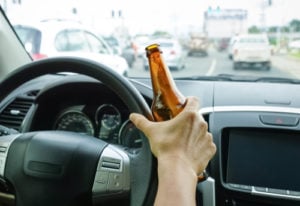
Depending on your age, you may face either a DWI (driving while intoxicated) or a DUI (driving under the influence) charge if you operated a vehicle while intoxicated in Texas.
The difference between DWI and DUI in Texas laws applies to the age of the charged driver. If you’re 21 or older, the DWI charge will apply to you. Meanwhile, if you’re under 21, the DUI charge or the DWI charge could apply; it’s up to the officer. In general, a DWI charge is more serious.
You need a Houston DWI lawyer from our firm for your case, regardless of your age. Texas judges can hand out relatively harsh sentences in DWI and DUI cases, so you may suffer significant penalties, even as a first-time offender.
Before you take your next step, it may help to understand the differences between DWI and DUI in Texas law.
What Is the Difference Between a DUI and a DWI in Texas?
Facing a DWI or DUI can seem daunting, but it’ll help to understand the offenses and how they’re typically charged. The offenses are similar since they involve a person operating a vehicle in a public place with alcohol or drugs in their system.
However, the primary difference between a DWI and a DUI in Texas is that DWI generally applies to people ages 21 and older, whereas DUI generally applies to people under 21. Since Texas holds adults to a different legal standard than minors and younger adults, the penalties for a DWI can be more severe.
What Constitutes DWI in Texas?
Whenever a person 21 years old or older operates a vehicle in a public place while being legally intoxicated, they could face a DWI charge.
Being intoxicated means having lost the normal use of your mental or physical faculties or a blood alcohol concentration (BAC) of 0.08 or higher. This BAC is the limit Texas has adopted as the per se limit.
A person aged 17 – 21 can also face a DWI charge because at 17 in Texas, a person is considered an adult.
What Constitutes a DUI in Texas?
It’s actually quite easy for a minor to face a driving under the influence of alcohol (DUI) charge in Texas. That’s because Texas has a zero-tolerance policy for underage drinking.
Thus, if someone under the age of 21 operates a vehicle with any alcohol in their system, they will likely be charged with DUI, regardless of impairment.
Even having 0.01 percent BAC as measured by a Breathalyzer, urine test, or blood test can get you taken into custody.
Is a DWI Worse Than a DUI?
Yes, a DWI charge in Texas is worse than a DUI because of the more severe penalties. DUIs fall under the Texas Alcoholic Beverage Code, as opposed to DWIs, which fall under Texas Penal Code § 49.04.
A DUI is a Class C misdemeanor, essentially a traffic ticket, while a DWI is a Class B or Class A misdemeanor or higher, depending on the specific details of your case.
For a legal consultation, call (713) 225-1900
What Are the Penalties for DWIs and DUIs?
Even for first-time offenders, the penalties for DWIs and DUIs can be very significant. For example, for a DWI charge, a first-time offender faces fines of up to $2,000, a driver’s license suspension for up to two years, and jail time of up to 180 days.
However, for a DUI charge, a first-time offender faces a maximum fine of $500, a 60-day suspension of their driver’s license, and up to 40 hours of community service.
There are other non-criminal penalties you can face after a DWI or a DUI. For example:
- You could be kicked out of school.
- You could lose your scholarship or financial aid.
- You could lose custody of your children.
- You could lose your job.
- You could lose your professional license.
- You could have issues finding a new job.
- You could face issues within your family or friend group.
- You could face increased car insurance costs.
You could face more severe charges in certain situations. For example, if this is your second DWI charge, you face Class A misdemeanor charges. You will also face this charge if your BAC was 0.15 or higher.
A Class A misdemeanor comes with:
- Up to $4,000 in fines
- Up to one year in jail
If there was a child under the age of 15 in the car with you when you were pulled over, you could face a state jail felony charge. If you are convicted, you could be fined up to $10,000 and spend up to two years in state jail.
If you are charged with causing a fatal accident while intoxicated, you face second-degree felony charges. A second-degree felony conviction comes with:
- Up to $10,000 in fines
- 2 to 20 years in prison
The penalties increase with each DUI charge as well.
Is Jail Time Mandatory After a DUI?
No, jail time is not mandatory after a DUI. Jail time is not a potential penalty for the charge of driving under the influence.
Click to contact our Houston lawyer today
Is Jail Time Mandatory After a DWI?
In most cases, jail time is not mandatory after a DWI.
However, if you face Class A misdemeanor DWI charges, you face a minimum of 30 days in jail.
Complete a Case Evaluation form now
Will I Lose My License After a DUI or DWI?
In many cases, yes, you will lose your license after a DUI or a DWI. However, you have the right to request an Administrative License Revocation (ALR) hearing to fight for your license.
An ALR hearing gives you and your attorney the opportunity to challenge the evidence the prosecution has against you. For example, Jay may argue that the Breathalyzer was not calibrated or used properly, which led to your false positive.
Jay can also use his experience as a field sobriety test practitioner and instructor to examine the test results and poke holes in the case against you. Jay could also argue that the cops didn’t have probable cause or reasonable suspicion and, as such, all evidence was illegally gathered.
The Administrative Law Judge (ALJ) will determine whether or not the department proved its case against you. If not, your license will not be suspended.
Note: If you get convicted of a DUI, but you did not have your driver’s license yet, there are still consequences to your driving privileges.
How an Attorney Will Help in Your DWI or DUI Case in Texas
Getting arrested for a DWI or DUI can be a scary experience. You may feel overwhelmed at the prospect of facing jail time and having to make a case for yourself. However, you don’t have to fight a DWI or DUI charge on your own. Instead, a DWI lawyer can help you defend against these charges.
A criminal defense attorney from our firm can make your case for you, fighting for a dismissal or reduction of your charges. To build your case, your lawyer will:
- Review the officer’s report as to what was probable cause for the initial detention
- Investigate your arrest for any illegality or irregularity
- Collect evidence to support your case, such as police dashcam footage
- Corroborate your evidence with bystander or expert witness testimony
- Challenge the authorities’ evidence against you
- Explore the possibility of a plea bargain with the prosecutor
- Fight for dismissal or reduction of your charges
- Argue your case before a judge and jury if necessary
Defense Strategies for a DWI
The defense strategies our team uses depend on the specifics of your arrest. Here are a few examples:
- We can establish that the police did not have reasonable suspicion or probable cause. If we prove this, any evidence obtained will likely be thrown out.
- We can review the field sobriety test results to see if we can poke holes in the case against you. Our founder is a certified field sobriety test practitioner and instructor, so he knows the right way these tests should be done.
- We can examine the Breathalyzer test results to determine whether it could be a false positive. This can happen if the Breathalyzer wasn’t calibrated correctly or if the officer performed the test incorrectly. It can also happen as a result of diet. For example, our founder won a case after arguing his client’s false positive result was due to his taking part in the Keto diet.
He is also an ACS-CHAL lawyer-scientist and certified in forensic chromatography for alcohol and drugs. He can use this knowledge, experience, and skill to approach your case in a way that other attorneys won’t.
Can I Get a DWI or DUI Reduced?
Depending on the county, a good lawyer can get your DWI or DUI reduced. What that looks like depends on the specifics of your case.
For example, if your blood alcohol concentration is right at 0.15, your attorney may be able to get the charge reduced from a Class A misdemeanor to a Class B misdemeanor.
In some cases, you could get a DWI reduced to a reckless driving charge.
What Happens to a Minor at a DUI Traffic Stop?
When a law enforcement officer has probable cause or reasonable suspicion, they are allowed to pull over any vehicle to investigate. This rule applies to minor and adult drivers. The officer can request the driver to participate in standardized field sobriety testing, which can have more than one component.
If the officer smells alcohol on the breath, observes conduct consistent with impairment, or believes for another reason that the minor has consumed any alcohol, the officer is allowed to:
- Arrest and handcuff the minor
- Have the vehicle towed
- Take the minor to a county jail or police station, where they will get asked to take a breathalyzer test
- Take the minor to a medical facility for a blood test
Under Texas law, a minor who operates a car, truck, or watercraft with any measurable alcohol in their bloodstream falls under the implied consent rule. The individual automatically consents to cooperate with a breathalyzer or blood test. Also, if there was an accident involving a severe or fatal injury, the officer can apply for a warrant to require the minor to give a blood sample.
Get Help from an Experienced DWI Attorney in Texas
Now that you understand the difference between DWI and DUI in Texas law, you can take the next step toward resolving your or your loved one’s case. If you were arrested or charged with a DWI, a criminal defense lawyer from Blass Law can help.
Call us today for a no-obligation consultation. Our firm handles criminal cases such as DWI almost exclusively, so we know how to resolve your case for you.
You don’t want to risk losing your license or your freedom by hiring a public defender or inexperienced attorney. You want Houston criminal defense lawyer Jay Blass Cohen and the Blass Law team.
During our initial consultation, we can give you a better idea of how we’ll approach your defense. So, call us today or fill out our contact form to get started on your DWI or DUI case.
Call or text (713) 225-1900 or complete a Case Evaluation form


